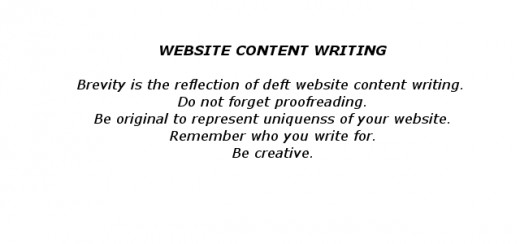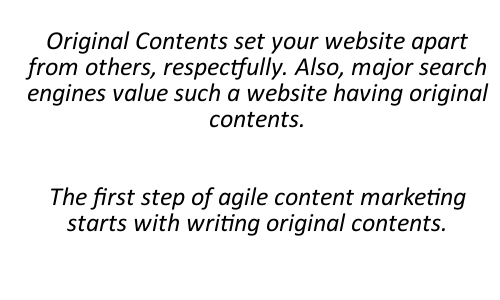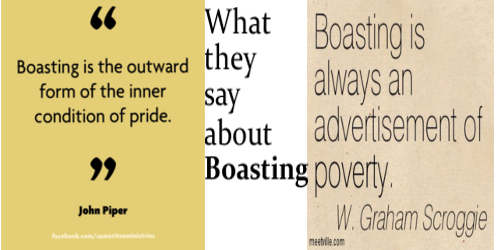Explaining Website Content Writing
What Is Website Content Writing?
Website content writing involves writing compelling and engaging contents for a domain or a website for the purpose of conveying messages or product description of a brand. The fundamental behind writing for a domain is to serve the common purpose of a brand, to tell its target audience what type of product or service it deals in.
What you should follow in:

How Does Website Content Writing Differ From Other Types Of Writing?
The website content writing, as the name itself suggests, is written for the purpose of describing (in laconic aspect) about the product or service of a brand. Thus, aside from other types of writing (articles, blogs etc.), this involves some serious consideration. For instance, a writer must have keen insight about a brand’s business, mission and vision. The writer has to write contents in a presentable way.
Be careful that this style of writing is like a RESUME/CV of a website, representing every aspect of its online personality, its business attitude, and its objective for future engagement with its potential audiences/customers.
Is Writing Contents For Websites Difficult?
It depends how well you've mapped out a plan before you start writing. As said above, a writer must ensure that he/she is well aware of the brand’s business information. Also, the writer should possess specialization in writing (this also involves having keen insight of grammar/syntax etc). It is not the knowledge but specialization that counts. So, if a writer doesn't have these qualities, he can’t write well.
How To Write Website Contents?
The article explains five key ways that one should consider in context of website content writing:
Knowledge Of The Brand
As mentioned earlier, a writer must ensure that he/she is aware of the nature of business that their client does. If you are writing for your own website, make sure you know your purpose. For instance, if your client deals in the sale of hardware products, your contents featuring tips and suggestions of gardening won’t be help your client (just kidding). This must be self-explanatory of your business for your target audience.
Know Your Audience
It is not just the knowledge about the brand’s business, but also the knowledge about the target audience that matters a lot in the context of writing contents for a website.
For example, if your brand runs a business of garment and you have written something about gardening tips, it will be useless for your readers.
Similarly, a manufacturing company can’t post contents on its website that offers information about wedding reception or other unrelated contents.
Therefore, it is must to have sound knowledge about your target audience. Believe it or not, most people ignore this aspect which is why their contents seem to be focusing on everyone (and fail to fetch leads).



Write Original
Original contents improve the value of a domain and represent your brand strongly. One of the best ways to write original contents is to read various articles explaining how to write best website contents.
Do not copy them, just hatch an idea based on the inputs, write in your style and use plagiarism checker to ensure originality.
Be Creative
If you think that generic contents can empower popularity of your website, forget it. Be creative and exert uniqueness. How to be creative depends on how you imagine the conceivable structure of your contents. Anybody can write ordinary contents, but it takes someone specialized to write creatively.
Keywords also matter while writing website contents
Head, Sub-head
Write contents with heading and then sub-heading. If writing for SEO (Search Engine Optimization), always follow H1, H2… style of writing contents (aka heading tags).
This will give much exposure to your website’s contents.
You must know keywords placement technique as well. Better consult a SEO expert for more information about designing possible framework of “SEO website content writing”.
Brevity Rules
If you tend to write something lengthy which can otherwise be expressed in few words, don’t do that when it comes to writing contents for a website. Contents represent personality of a brand. Cut short unnecessary contents, make it brief and laconic. Most people do not read entire contents. Save time for yourself and for your target audience. Write short and meaningful contents.
Never Show-off or Boast
Words bite and if they are severe in tonality, they sting deep within. To state otherwise, do not show off or boast of your professional expertise.
As a matter of fact, people tend to skip reading your achievement, accolades or experience. They usually care in what way you would benefit them, if they hire your service. Avoid pointless exaggeration of your expertise.
One of the solutions to self-exaggeration - 40% of the entire length of your contents should adhere to your website's service offerings, let the rest 60% talk about benefits.
If possible, give your target audience a valid reason to believe in those benefits. Support your claims through case studies (write, if you have none), testimonials and PR (press release, mentioning your recent engagement with a client with reason, why). I bet, by following these things, your website will look very authentic.
Website content writing is not all about YOU

Proofread
No need to talk much about this (assuming you know what I mean). As a matter of fact, proofreading helps you identify areas requiring improvement.
Since website is a medium between your brand and your target audience, always proofread every word before someone goes nut (after seeing grammar mistakes).
Proofreading - The watchword

End Note
Note that you don’t necessarily need to be pedantic grammarian, just proofread in a way that your readers don’t have to take the trouble of re-reading. Too much proofreading kills the rhythm or beauty of sentences.
Prune unnecessary sentences, check subject-verb-agreement, punctuation positioning. Proofread aloud, it will help you figure out mistakes easily.
At last, website content writing is not just like any other form of writing.
Since you are writing for a domain, make sure inclusion of originality, readability and credibility of contents.
Contents represent personality type of a brand, always remember that. Also, if you've got certain writing habits that may hurt your ability to write good contents, better avoid them.








